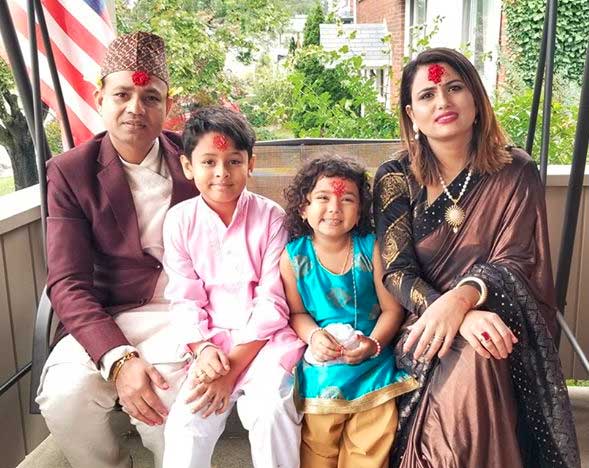
The Luckiest Refugees: Bhola and Laxmi’s story
Chapter 1
Fleeing home
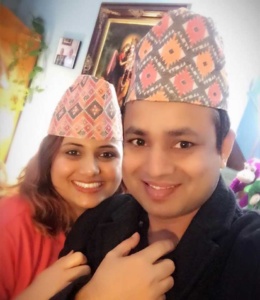
Though they didn’t know it, Bhola and Laxmi grew up in the same Bhutanese village. They share memories of the same steep mountains and deep, green pastures. They also share memories of terror when, in 1988, their families were forced to flee with only what they could carry. Just children, neither truly understood what was happening.
As Bhutanese armies ransacked and destroyed the only home they’d ever known, their families knew they had to leave to stay alive. They left their farms, their animals and good jobs to travel to a new country in hopes of safety and a better life.
Chapter 2
Life and love in a refugee camp
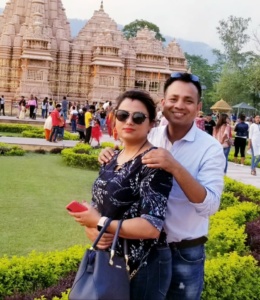
After a long, dangerous journey, they arrived at a refugee camp in Nepal that would be their home for the next 20 years.
“When we arrived, each family was given bamboo sticks and plastic to build a shelter. There were no beds, no doors and no windows,” Laxmi recalled. “The floor was just dirt, but we did our best to keep it clean.”
Because the Nepali government wasn’t prepared for the influx of refugees, camps were built wherever space allowed. “I remember being scared of the wild animals. Elephants used to come into the camp and trample our tents. We’d have to build torches and chase them off,” she added.
Despite the wind, rain and wildlife that frequently caused damage, each family had what it valued most: being together in their own home.
Without electricity, kerosene lamps became a cherished source of light and heat. A small stove allowed them to prepare food. The standard ration diet included rice, lentils, pumpkin, cabbage, onions, and peppers. If a family wanted fruit or other vegetables, they could sell some of their rice or trade with those living outside the camp.
Surprisingly, Laxmi and Bhola both remember feeling lucky. They were safe, they had food, and most importantly, they had access to education.
“We were the luckiest refugees in the word. We learned English and got our educations in the camp. Our parents lost everything, but at least they knew we were getting an education,” Bhola said.
Though their families had always known each other, it wasn’t until their late teenage years that Laxmi started to develop romantic feelings for Bhola. “By the time I was finishing high school, I felt like he was the man I was looking for.”
In 2008, with permission from their families, they decided to marry.
Before their wedding, a fire destroyed the entire camp. Many, including both Laxmi and Bhola, lost their homes and all possessions. Despite the tragedy, love prevailed. The pair wed in a local temple, surrounded by 150 of their family and friends. After the ceremony, the newlyweds traveled into the jungle and built the hut where they would begin their new life together as husband and wife.
Chapter 3
Starting a family in America
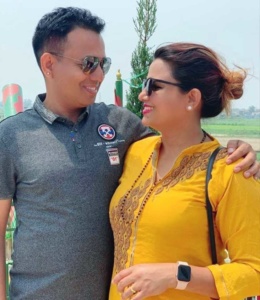
Soon after their wedding, the Dhungana’s applied and received the news that they would begin the 21-hour journey to the United States. From Nepal, they traveled to Kathmandu, New Delhi, and Brussels before landing in New Jersey. From there, they took one last flight to Pittsburgh.
“Coming to the United States was so exciting,” Bhola enthused before changing tones, “But then really, really challenging after that.”
With help from Catholic Charities, the Dhungana’s settled in an apartment near Crafton and welcomed their first child, Rhythm, in 2010. Laxmi stayed home with their new baby while Bhola worked 16-hour days to make ends meet. “It was very difficult; he was working so hard and I was always by myself. It was lonely,” Laxmi remembered.
A cousin started babysitting Rhythm so Laxmi could work part-time. She found a job as a housekeeper at Children’s Hospital of Pittsburgh and, although she was spending hours on the bus, enjoyed working and practicing her English.
Two years later, their little family relocated to Prospect Park in Whitehall. Laxmi loved working but found that she was spending almost her entire paycheck on child care for Rhythm. When she found out she was pregnant with their next child, Raizel, Laxmi decided to stay home.
After hearing about South Hills Interfaith Movement (SHIM) from a friend, Rhythm was enrolled in SHIM’s early childhood program and their family was referred to SHIM’s home visiting services. During the home visits, they received parenting tips, info about child development, help with budgeting and learned about services they wouldn’t have been aware of otherwise.
Chapter 4
Becoming business owners
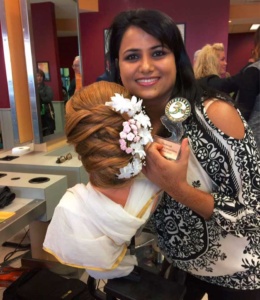
By 2015, Laxmi was settled in her role as a wife and mother and Bhola was dedicated to serving the community through his work as a special services advocate on Women’s Center and Shelter of Greater Pittsburgh’s refugee, immigrant, and limited-English speaking (RIL) team. But something was still missing.
Now that Rhythm and Raizel were a little older, Laxmi wanted to return to work. Like her husband, she hoped to find work that would allow her to give back to the community.
“I loved going to the hair salons here, but it was hard to find the right words to explain what I wanted to the stylists. It was frustrating,” Laxmi shared. “I decided to go to school to learn so I could do hair for my community and make our people feel beautiful. They deserve it, too.”
After graduating from Empire Beauty School, Laxmi worked in a salon and got lots of experience but found she didn’t feel like herself in the environment. She had plenty of clients and would often talk to Bhola about her dreams of opening her own salon, a special place for their community.
“She was determined,” Bhola recalled. “I thought, ‘We can do this. Yes, let’s open our own place!’”
As with all trials they’ve faced, Bhola and Laxmi worked together through the tribulations of starting a business. They found a space, navigated the rental agreement, got the necessary permits, finished a full renovation and opened FreeStyle Beauty Salon in 2018.
“We are just trying our best to be role models for our kids and contribute to the community,” Bhola said, proudly.
Bhola and Laxmi want nothing more than to provide a good life for their children. Rhythm and Raizel don’t know the fear of fleeing from home, the pain of hunger or the chill of rain on their faces at night. When they hear their parents talk about their experiences in the refugee camp, it sounds like a distant dream. And that’s just how Bhola and Laxmi want to keep it.
More stories
Read more stories about your neighbors
Test your refugee IQ
Take the quiz and see how well you know your refugee neighbors.
Get involved
Learn more about volunteer opportunities, host a food drive, or donate to support SHIM’s work.

